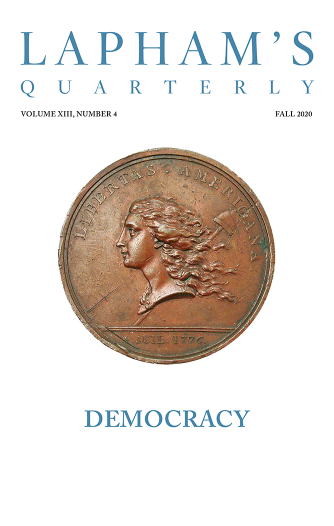Gerald dined in the refectory with the monks of Canterbury. And as he sat there at the high table with the prior and the seniors, he noted two things: the multitude of the dishes and the excessive superfluity of signs which the monks made to one another.
For there was the prior giving so many dishes to the serving monks, and they in their turn bearing these as gifts to the lower tables; and there were those, to whom these gifts were brought, offering their thanks, and all of them gesticulating with fingers, hands, and arms, and whistling one to another in lieu of speaking, all extravagating in a manner more free and frivolous than was seemly—so that Gerald seemed to be seated at a stage play or among actors and jesters. It would therefore be more consonant with good order and decency to speak modestly in human speech than with signs and whistlings thus jocosely to indulge in dumb garrulity. And as to the dishes and the number thereof, what shall I say, save that I have oft heard Gerald himself declare that sixteen very costly dishes or even more were placed upon the table in order, not to say contrary to all order. Finally, potherbs were brought to every table but were little tasted. For you might see so many kinds of fish, roast and boiled, stuffed and fried, so many dishes contrived with eggs and pepper by dexterous cooks, so many flavorings and condiments, compounded with like dexterity to tickle gluttony and awaken appetite. Moreover you might see in the midst of such abundance “wine and strong drink,” metheglin and claret, must, mead, and mulberry juice, and all that can intoxicate, beverages so choice that beer, such as is made at its best in England and above all in Kent, found no place among them. There, beer among other drinks is as potherbs are among made dishes. Such extreme superfluity and extravagance might you behold both in food and drink, as might not only beget loathing in him that partook thereof, but weariness even in him that beheld it. What would Paul the hermit say to this? What Antony, what Benedict, the father and founder of monastic life? Or what would Jerome say, who in the Lives of the Fathers extols with such praise the parsimony, abstinence, and simplicity of the primitive Church, saying among other things that as the Church grew in wealth, so she declined in virtue? Gerald would also at times recount a story, how the monks of St. Swithin of Winchester together with their prior prostrated themselves in the mud before Henry II and complained to him with tears and lamentations that Bishop Richard whom they had as their head in lieu of an abbot, had deprived them of three dishes. And when the king inquired how many dishes were left them, they replied “ten.” “And I,” said the king, “am content in my court with three. Perish your bishop, if he does not reduce your dishes to the number of mine!” To what purpose is this waste, more especially in men professing religion and displaying it in their habit? For these superfluities might have been sold and given to the poor. But this is the color they put upon their behavior, to wit, that the great number of courses served in their order was invented for the sake of amplifying and increasing the alms they give to the poor. Nevertheless, scandal might have been better and more wisely avoided and provision made for their honor and simplicity of life, had they been content with fewer dishes and had they refreshed Christ’s poor out of those superfluities; and thus they would curb their gluttony, lessen the scandal, and increase their alms in a far more salutary way.
Used with permission of Boydell & Brewer Ltd.
From his autobiography. After acting as archdeacon of Brecknock and studying canon law and theology in Paris, Gerald entered the service of Henry II, traveling on a military expedition to Ireland and raising troops in Wales for the Third Crusade. Possessing a hot temper and a passion for clerical reform, Gerald was twice unsuccessfully nominated for the post he most sought, the bishopric of St. David’s Cathedral.
Back to Issue



